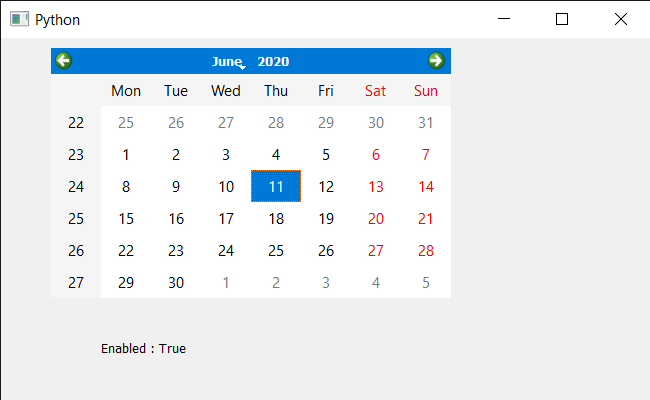En este artículo veremos cómo podemos obtener la propiedad enable del QCalendarWidget. La propiedad habilitada se mantiene independientemente de si el calendario está habilitado o no. En general, un calendario habilitado maneja eventos de teclado y mouse y un calendario deshabilitado no. De forma predeterminada, el calendario está habilitado, aunque podemos establecer la propiedad habilitada con la ayuda del método setEnabled.
Para hacer esto, usaremos el método isEnabled con el objeto QCalendarWidget.
Sintaxis : calendar.isEnabled()
Argumento : No requiere argumento
Devolución : Devuelve bool
A continuación se muestra la implementación.
Python3
# importing libraries
from PyQt5.QtWidgets import *
from PyQt5 import QtCore, QtGui
from PyQt5.QtGui import *
from PyQt5.QtCore import *
import sys
class Window(QMainWindow):
def __init__(self):
super().__init__()
# setting title
self.setWindowTitle("Python ")
# setting geometry
self.setGeometry(100, 100, 650, 400)
# calling method
self.UiComponents()
# showing all the widgets
self.show()
# method for components
def UiComponents(self):
# creating a QCalendarWidget object
self.calendar = QCalendarWidget(self)
# setting geometry to the calendar
self.calendar.setGeometry(50, 10, 400, 250)
# setting cursor
self.calendar.setCursor(Qt.PointingHandCursor)
# creating label to show the properties
self.label = QLabel(self)
# setting geometry to the label
self.label.setGeometry(100, 280, 250, 60)
# making label multi line
self.label.setWordWrap(True)
# checking if the calendar is enabled
value = self.calendar.isEnabled()
# setting text to the label
self.label.setText("Enabled : " + str(value))
# create pyqt5 app
App = QApplication(sys.argv)
# create the instance of our Window
window = Window()
# start the app
sys.exit(App.exec())
Producción :

Publicación traducida automáticamente
Artículo escrito por rakshitarora y traducido por Barcelona Geeks. The original can be accessed here. Licence: CCBY-SA